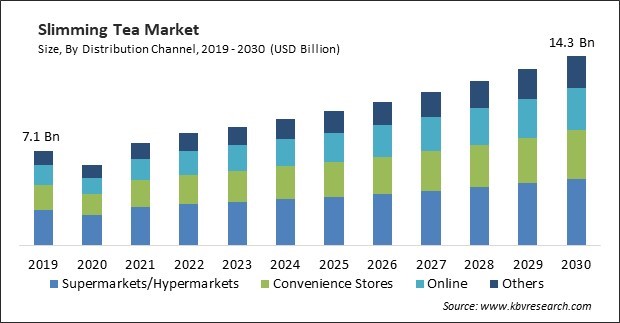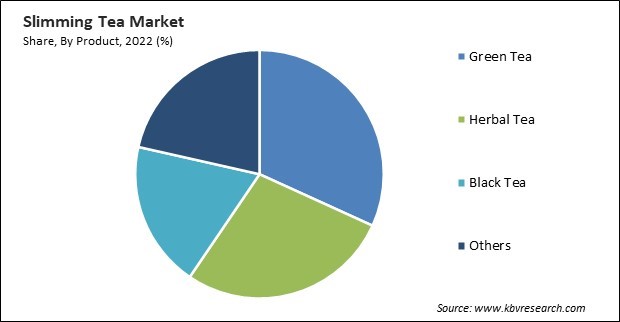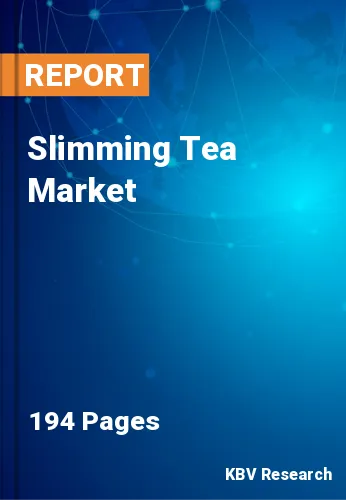The Global Slimming Tea Market size is expected to reach $14.3 billion by 2030, rising at a market growth of 6.9% CAGR during the forecast period.
European consumers increasingly seek natural and herbal remedies for various health concerns, including weight management. Thus, the European region generated $2,527.3 million revenue in the market in 2022. Slimming teas, often made from a blend of herbs and botanicals, align with this preference for natural solutions. Europe is known for its diverse dietary choices, including vegetarian, vegan, and gluten-free diets. Slimming tea manufacturers have responded by offering products that cater to these dietary restrictions and preferences. Europe has a rich history of herbal remedies and traditional teas. The use of herbal teas for health purposes is deeply ingrained in many European cultures, contributing to the popularity of slimming teas. Owing to these factors, there will be an increased demand in the segment. Some of the factors impacting the market are global rise in obesity rates and related health issues, exclusion of artificial additives and chemicals, and regulatory scrutiny owing to concerns about health claims and product safety.

As obesity rates continue to climb worldwide, there is a growing demand for effective weight management solutions. Slimming teas are perceived as a natural and non-invasive option for individuals looking to shed extra pounds or maintain a healthy weight. This increased demand drives sales of slimming teas. The rising prevalence of obesity has heightened health awareness among consumers. People are more conscious of maintaining a healthy weight to reduce the risk of obesity-related health issues like heart disease, diabetes, and hypertension. Slimming teas align with this health-conscious mindset, making consumers consider them part of their wellness routines. Slimming teas often contain herbal ingredients known for their health benefits beyond weight management, such as digestive support, detoxification, and stress reduction. This holistic approach to wellness attracts consumers seeking multifaceted health solutions. These factors will drive the demand in the market. Moreover, brands that emphasize the use of natural ingredients can differentiate themselves in a crowded market. This can lead to brand loyalty and repeat purchases among consumers prioritizing natural and wholesome products. The focus on natural ingredients often extends to sustainable sourcing practices. Brands prioritizing responsible ingredient sourcing and eco-friendly packaging appeal to environmentally conscious consumers. Slimming tea products that feature "clean labels" with minimal additives and preservatives resonate with consumers looking for simplicity and transparency in product ingredients. As a result, the market will expand rapidly in the coming years.
However, Stringent regulations can limit the ingredients and health claims manufacturers can use in their slimming tea products. This can lead to a reduced variety of slimming teas in the market, limiting consumers' choices. Ensuring compliance with varying and often complex regulations can be costly for manufacturers. Compliance efforts may require extensive research, testing, documentation, and legal support. These costs can be passed on to consumers, making slimming teas more expensive. Compliance with different regulations in various countries can be complex and resource-intensive. These factors will pose a restraining effect on the market.
Based on product, the market is segmented into black tea, green tea, herbal tea, and others. The green tea segment held the largest revenue share in the market in 2022. Increasing health consciousness and a desire for healthier lifestyles have prompted consumers to seek natural and effective weight management solutions. Green tea is perceived as a healthy beverage with various health benefits, including its potential to aid in weight loss. Extensive scientific research has highlighted the health benefits of green tea, including its role in boosting metabolism, burning fat, and promoting overall well-being. These findings have reinforced the credibility of green tea as an effective slimming aid. These factors will help to boost the demand in the segment.

On the basis of distribution channel, the market is divided into hypermarkets/supermarkets, convenience stores, online, and others. In 2022, the online segment witnessed a substantial revenue share in the market. Online platforms have enabled slimming tea brands to reach a global audience. Customers from different regions and countries can access and order products, allowing brands to expand their reach beyond their local markets. This global presence has boosted sales and promoted cultural diversity in tea choices. The online segment offers consumers access to various slimming tea products.
| Report Attribute | Details |
|---|---|
| Market size value in 2022 | USD 8.4 Billion |
| Market size forecast in 2030 | USD 14.3 Billion |
| Base Year | 2022 |
| Historical Period | 2019 to 2021 |
| Forecast Period | 2023 to 2030 |
| Revenue Growth Rate | CAGR of 6.9% from 2023 to 2030 |
| Number of Pages | 197 |
| Number of Table | 280 |
| Report coverage | Market Trends, Revenue Estimation and Forecast, Segmentation Analysis, Regional and Country Breakdown, Companies Strategic Developments, Company Profiling |
| Segments covered | Product, Distribution Channel, Region |
| Country scope | US, Canada, Mexico, Germany, UK, France, Russia, Spain, Italy, China, Japan, India, South Korea, Singapore, Malaysia, Brazil, Argentina, UAE, Saudi Arabia, South Africa, Nigeria |
| Growth Drivers |
|
| Restraints |
|
By region, the market is segmented into North America, Europe, Asia Pacific, and LAMEA. The Asia Pacific segment procured the highest revenue share in the market in 2022. Many countries in Asia have a rich tradition of herbal medicine. Slimming teas that incorporate traditional herbal ingredients are well-received by consumers who value such remedies' perceived efficacy and safety. Tea holds immense cultural significance in many APAC countries, including China, Japan, India, and Thailand. The tradition of tea consumption has seamlessly extended to include slimming teas, making their adoption more natural and widespread. APAC is home to a significant portion of the world's population.
Free Valuable Insights: Global Slimming Tea Market size to reach USD 14.3 Billion by 2030
The market research report covers the analysis of key stake holders of the market. Key companies profiled in the report include Nestle S.A, Tata Consumer Products Limited (Tata Group), Ito En, Ltd., Unilever PLC, Associated British Foods PLC (Wittington Investments Limited), The Hain Celestial Group, Inc., Adagio Teas, Triple Leaf Tea, Inc., Dilmah Ceylon Tea Company PLC (Dilmah), and Hankook Tea.
By Distribution Channel
By Product
By Geography
This Market size is expected to reach $14.3 billion by 2030.
Global rise in obesity rates and related health issues are driving the Market in coming years, however, Regulatory scrutiny owing to concerns about health claims and product safety restraints the growth of the Market.
Nestle S.A, Tata Consumer Products Limited (Tata Group), Ito En, Ltd., Unilever PLC, Associated British Foods PLC (Wittington Investments Limited), The Hain Celestial Group, Inc., Adagio Teas, Triple Leaf Tea, Inc., Dilmah Ceylon Tea Company PLC (Dilmah), and Hankook Tea.
The expected CAGR of this Market is 6.9% from 2023 to 2030.
The Supermarkets/Hypermarkets segment is leading the Market, by Distribution Channel in 2022 thereby, achieving a market value of $5 Billion by 2030.
The Asia Pacific region dominated the Market, by region in 2022, and would continue to be a dominant market till 2030; thereby, achieving a market value of $5.2 Billion by 2030.
Our team of dedicated experts can provide you with attractive expansion opportunities for your business.

